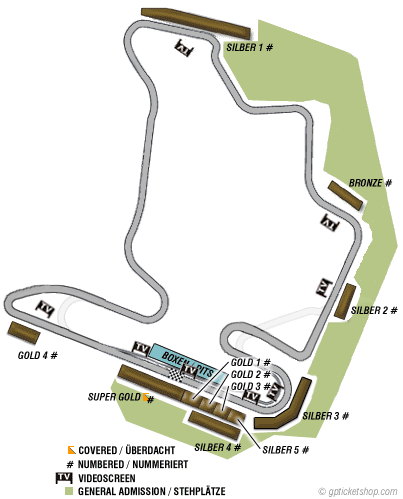Az itt lévő link 11 kifejezést sorol fel, melyeket szerintük csak a britek értenek. Ez talán enyhe túlzás, hiszen valószínűleg az amerikaiak, vagy az ausztrálok is megértik, sőt egy kis utánanézéssel még mi is:)
 from: matadornetwork.com
from: matadornetwork.com
1. Pop one's clogs = feldobja a papucsát / talpát (azaz meghal)
“No one knew he was about to pop his clogs.”
2. That went down a treat = nagyon jól sikerült, élvezetes
“That cake went down a treat.”
3. Take the mickey = felhúzni, felbosszantani vkit
“Stop taking the mickey out of your brother.”
4. Itchy feet = nyughatatlan, izgága, be van sózva
After two years in the job she’s got itchy feet, so she’s going to spend three months in Australia.”
5. At a loose end = unatkozó, ráérő, semmi dolga
“He’s been at a loose end ever since he retired.”
6. Another string to your bow = vmilyen szakértelemmel, tudással rendelkezni, ami még jól jöhet
“I’m learning French so I’ll have another string to my bow.”
7. As the actress said to the bishop = ártatlan, de kétértelmű, áthallásos megjegyzés
“Blimey, that’s a big one — as the actress said to the bishop.”
8. Bob’s your uncle (and fanny’s your aunt) = íme, tessék, már meg is van, már ott is vagy
A: “Where’s the Queen Elizabeth Pub?”
B: “You go down the road, take the first left and Bob’s your uncle (and fanny’s your aunt) — there it is on the corner!”
9. Cheap as chips = olcsó, nagyon jó vétel, a hülyének is megéri
“Only a fiver for a ticket — cheap as chips mate!”
10. Look after the pennies and the pounds will look after themselves - kb. Aki a kicsit nem becsüli, az a nagyot nem érdemli
11. Nosy parker = kotnyeles ember
“Stop being such a nosy parker! They’re having a private conversation!”
from: http://matadornetwork.com/abroad/11-idioms-brits-understand/
"-Ing"-es igével kezdődő filmcímek
Címkék: movie titles angol magyar filmcímekk Ing movie titles
2014.12.16. 06:12
A Mental Floss oldalán találtam ezt a nagyon jó kis kvízjátékot.

Egészítsd ki a filmcímeket az alábbi "-ing"-es igék egyikével. A magyar cím nem mindig segít:)
1. being
2. blazing
3. breaking
4. changing
5. chasing
6. coming
7. crouching
8. crying
9. driving
10. educating
11. finding
12. going
13. leaving
14. looking
15. raging
16. raising
17. rambling
18. riding
19. romancing
20. running
21. saving
22. trading
23. waiting
24. working
25. wuthering
Filmcímek:
A. ............with Scissors / Kés, villa, olló
B. ............Julia / Csodálatos Júlia
C. ............Nemo / Némó nyomában
D. ............Lanes / Ütközéspont
E. ............in Cars with Boys / Fiúk az életemből
F. ............Tiger, Hidden Dragon / Tigris és Sárkány
G. ........... Private Ryan / Ryan közlegény megmentése
H. ........... Amy / Comic Strip - Képtelen Képregény
I...............the Waves / Hullámtörés
J...............Las Vegas / Las Vegas, végállomás
K...............to Exhale / Az igazira várva
L. .............Rose / Rózsa és tövis
M..............Miss Daisy / Miss Daisy sofőrje
N. ............Girl / Dolgozó lány
O..............Arizona / Arizóniai ördögfióka
P. .............the Stone / A smaragd románca
Q. ............Rita / Rita többet akar
R. ............ Places / Szerepcsere
S. ............ Bull / Dühöngő bika
T. ............Home / Hazatérés
U. ............for Mr Goodbar / Nappalok és éjszakák
V. ............ Saddles / Fényes nyergek
W............. My Way / Magam útját járom
X...............Heights / Üvöltő szelek
Y...............Game / Síró játék
Answer: 1-B; 2-V; 3-I; 4-D; 5-H; 6-T; 7-F; 8-Y; 9-M; 10-Q; 11-C; 12-W; 13-J; 14-U; 15-S; 16-O;
17-L; 18-E; 19-P; 20-A; 21-G; 22-R; 23-K; 24-N; 25-Y
Az játékot "eredetiben" itt tudod játszani: http://mentalfloss.com/article/59980/name-ing-movie
Új szavak az Oxford Dictionary szótár online változatában
Címkék: új szavak new words OxfordDictionaries.com
2014.12.12. 08:40
Az OxfordDictionaries.com online szótár rendszeresen bővíti szókészletét. A szótárba került legfrissebb szavak közül találsz itt 15 új kifejezést.

1. jel (= jealous) = féltékeny
These photos are making me jel.
2. xlnt (=excellent) = kiváló
an xlnt novel
3. tomoz (=tomorrow) = holnap
let's meet tomoz
4. IDC = I don’t care = nem érdekel, nem számít
IDC what anybody says - I know what I saw.
5. duck face = kacsaszáj
The pop star pursed her lips into a duck face in one shot.
6. mahoosive = óriási, hatalmas
The screen is mahoosive.
7. shiny bum = bürokrata, hivatalnok
The shiny bums in head office were writing memos.
8. simples = egyszerű, ennyi
If you don't like the store, don't shop there! Simples!
9. al desko = étkezés az íróasztalnál munka közben (opposite of al fresco)
Workers are skipping the midday meal in growing numbers and opting to eat al desko.
10. digital footprint = digitális lábnyom( az információ, amit magánszemélyként az Interneten magunk után hagyunk az online aktivitással)
Make sure your digital footprint doesn't damage your reputation.
11. tech wreck = high-tech cégek részvényárának zuhanórepülése
Microsoft survived the tech wreck.
12. man crush = férfiak közti erős kötödés, barátság (nem szexuális)
The actor confesses to having a man crush on Clooney.
13. keyboard warrior = álnéven aggresszív, sértő megnyilvánulásokat posztoló személy az Interneten
He doesn't deserve to be vilified by keyboard warrioirs.
14. fone = a „phone” informális írása
I switched my fone to silence.
15. hawt = a „hot” szó informális írása
He might be 40, but he is still extremely hawt.
from: http://blog.oxforddictionaries.com/2014/12/oxford-dictionaries-new-words-december-2014/
Tao Porchon Lynch, a világ legidősebb - 96 éves - jóga oktatója
Címkék: Tao Porchon Lynch yoga instructor the oldest yoga teacher
2014.12.09. 22:45
A világ legidősebb jóga oktatója a 96 éves amerikai Tao Porchon Lynch. Egy rövid videót találsz itt róla angolul + angol felirattal.
https://www.youtube.com/watch?v=u76yQEdflVM
A feliratot egybefüggően itt is elolvashatod:
TAO: "I'm 96-years-old and I just dance and do yoga."
Tao Porchon Lynch has been inspiring her students for generations, and has been recognised as the world's oldest yoga teacher by the Guinness Book of World Record.
Tao: "Nothing is impossible, whatever you want to do in life, just tune in and know that within you is the answer to everything and just don't think about - let anybody tell you y' know you getting old."
Energetic Tao was born at the end of the first war war in 1918, and has been a yoga instructor for the last 56 years.
TAO:" I've been like this since I was a child, there was so much to do and if we spend out time just sitting there like this it's not going to help at all."
Incredibly Tao manages to put people who are decades younger than her through their paces at her studio in Westchester, New York.
I really wish when I reach her age I will be as young as she is right now, I feel actually she's younger than me, she's very inspiring for me, she really helped me to change my whole life.
Tao also manages to inspire people a little closer to her age.
As a retired nurse, I saw many people, 96 in bed with a tubs, a feeding tube, unable to talk or walk and she is just is just the epitome of strength and energy. Her energy is overwhelming.
At a tender age of 85, Tao decided that yoga wasn't keeping her busy enough. So she took up ballroom dancing.
She is absolutely amazing, like no question doubt about that. She's stunning and a diamond on the floor every time. I honestly sometimes can't keep up with her anymore.
Despite having a hip replacement and recently suffering a broken wrist, Tao believes her positive attitude is what keeps her young.
TAO: "Once you put in your mind, anything negative, but every morning I get up, Idon't think what I'm going to do tomorrow, or today, or what I did yesterday, I think it's going to be the best day of my life."
And she has some simple advice for people who want to live a long a happy life.
TAO: "If you really trully believe, don't procrastinate, don't say I'll do it tomorrow. Tomorrow never comes."
Vocabulary:
to be recognised as = elismerni vminek, vmiként
tune in = ráhangolódni, ráállni
who are decades younger than her = akik évtizedekkel fiatalabbak nála
pace = sebesség
a retired nurse = nyugdíjas nővér
a feeding tube = tápláló- / etetőcső
epitome of = megtestesülése vminek
overwhelming = magával ragadó
at the tender age of = zsenge kor
to take up = elkezdeni (egysportot, hobbit)
stunning = káprázatos
can't keep up with sb = nem tudok lépst tartani vele
despite = vmi ellenére
hip replacement = csípőprotézis
broken wrist = eltört csukló
to procrastinate = halogatni, elhalasztani
Everything you always wanted to know about John Lennon (but were afraid to ask)
Címkék: John Lennon The Beatles
2014.12.08. 00:19
34 évvel ezelőtt ezen a napon (december 8-án) hunyt el John Lennon, akit New Yorkban, saját háza előtt lőtt le Mark Chapman.
A The Chive magazin tavaly néhány kevésbé ismert tényt közölt Lennonról, melyek közül 10-et itt olvashatsz el a teljes lista pedig ezen a linken található:
http://thechive.com/2014/10/10/a-few-little-known-facts-about-john-lennon-18-photos/
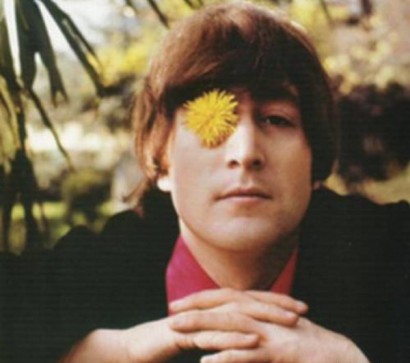
1. Lennon often said he’d rather have been a member of Monty Python than The Beatles.
Lennon gyakran mondta azt, hogy szívesebben lenne a Monty Python társulat tagja, mint a Beatlesé.
2. Lennon would drink 20 to 30 cups of tea or coffee every day.
Lennon 20–30 csésze kávét vagy teát ivott naponta.
3. It was Bob Dylan who introduced marijuana to Lennon and The Beatles.
Lennonnal és a The Beatles tagjaival Bob Dylan ismertette meg a marihuánát.
4. Lennon found out later in life he was dyslexic.
Lennon már jócskán felnőttkorában tudta meg, hogy diszlexiában szenved.
5.The last photograph taken of John Lennon while he was living was this one here, taken with his killer, Mark David Chapman.
Lennonról halála előtt néhány perccel korábban készült az utolsó fotó. Ezen gyilkosával, Mark David Chapmannel látható, amint autogrammot ad neki.
6. Without glasses, he was legally blind.
Szemüveg nélkül szinte semmit nem látott.
7. John Lennon hated his own singing voice.
Lennon utálta a saját énekhangját.
8. He loved to play Monopoly.
Imádott Monopoly-t játszani.
9. John was expelled from school for misbehavior at age 5.
Johnt 5 éves korában kitették az óvodából, rossz magaviselete miatt.
10. He was the only Beatle who didn’t become a full-time vegetarian.
Lennon volt az egyetlen olyan Beatles-tag, aki nem lett vegetáriánus.
source: thechive.com; nyest.hu
In 1620, a boat called Mayflower filled with more than one hundred people sailed across the Atlantic Ocean to settle in the New World. This religious group had begun to question the beliefs of the Church of England and they wanted to separate from it. The Pilgrims settled in Plymouth what is now in the state of Massachusetts.
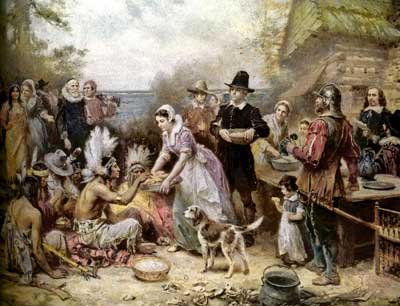
Their first winter in the New World was difficult. They had arrived too late to grow many crops, and without fresh food, half the colony died from disease. The following spring the Iroquois Indians taught them how to grow corn (maize), a new food for the colonists. They showed them other crops to grow in the unfamiliar soil and how to hunt and fish.
In the autumn of 1621, bountiful crops of corn, barley, beans and pumpkins were harvested. The colonists had much to be thankful for, so a feast was planned. They invited the local Indian chief and 90 Indians.
In following years, many of the original colonists celebrated the autumn harvest with a feast of thanks. After the United States became an independent country, Congress recommended one yearly day of thanksgiving for the whole nation to celebrate. George Washington suggested the date November 26 as Thanksgiving Day. Then in 1863 Abraham Lincoln asked all Americans to set aside the last Thursday in November as a day of thanksgiving*.
Thanksgiving is a time for tradition and sharing. Even if they live far away, family members gather for a reunion at the house of an older relative. All give thanks together for the good things that they have. In this spirit of sharing, civic groups and charitable organizations offer a traditional meal to those in need, particularly the homeless. On most tables throughout the United States, foods eaten at the first thanksgiving have become traditional.
Turkey, corn (or maize), pumpkins and cranberry sauce are symbols which represent the first Thanksgiving. Now all of these symbols are drawn on holiday decorations and greeting cards.
from: http://homeschooling.about.com/cs/unitssubjhol/a/thanksday.htm
Vocabulary:
to settle = letelepedni
to question the belief of the Church of England = megkérdőjelezni az Anglikán Egyház hitét, tanítását
crops = termények, termések
colony = kolónia, csoport
corn (maize) = kukorica (US and BrE)
colonist = gyarmatosító
unfaniliar soil = ismeretlen termőföld
bountiful = bőséges
barley = árpa
pumpkin = tök
to harvest = aratni
feast = lakoma, ünnepség
the local Indian chief = a helyi indián törzsfőnök
to set aside = félretenni, fenttartani vmit vmire
reunion = újratalálkozás
charitable organizations = jótékonysági szervezetek
(those) in need = rászorulók
cranberry = áfonya
Roald Dahl
Címkék: Roald Dahl Meghökkentő mesék Unexpected Tales Charlie and the Chocolate Factory Karcsi és a csokoládégyár
2014.11.23. 10:12
14 évvel ezelőtt, ezen a napon hunyt el Roald Dahl, többek közt a Meghökkentő mesék, és a Karcsi és a Csokoládégyár c. könyvek szerzője.
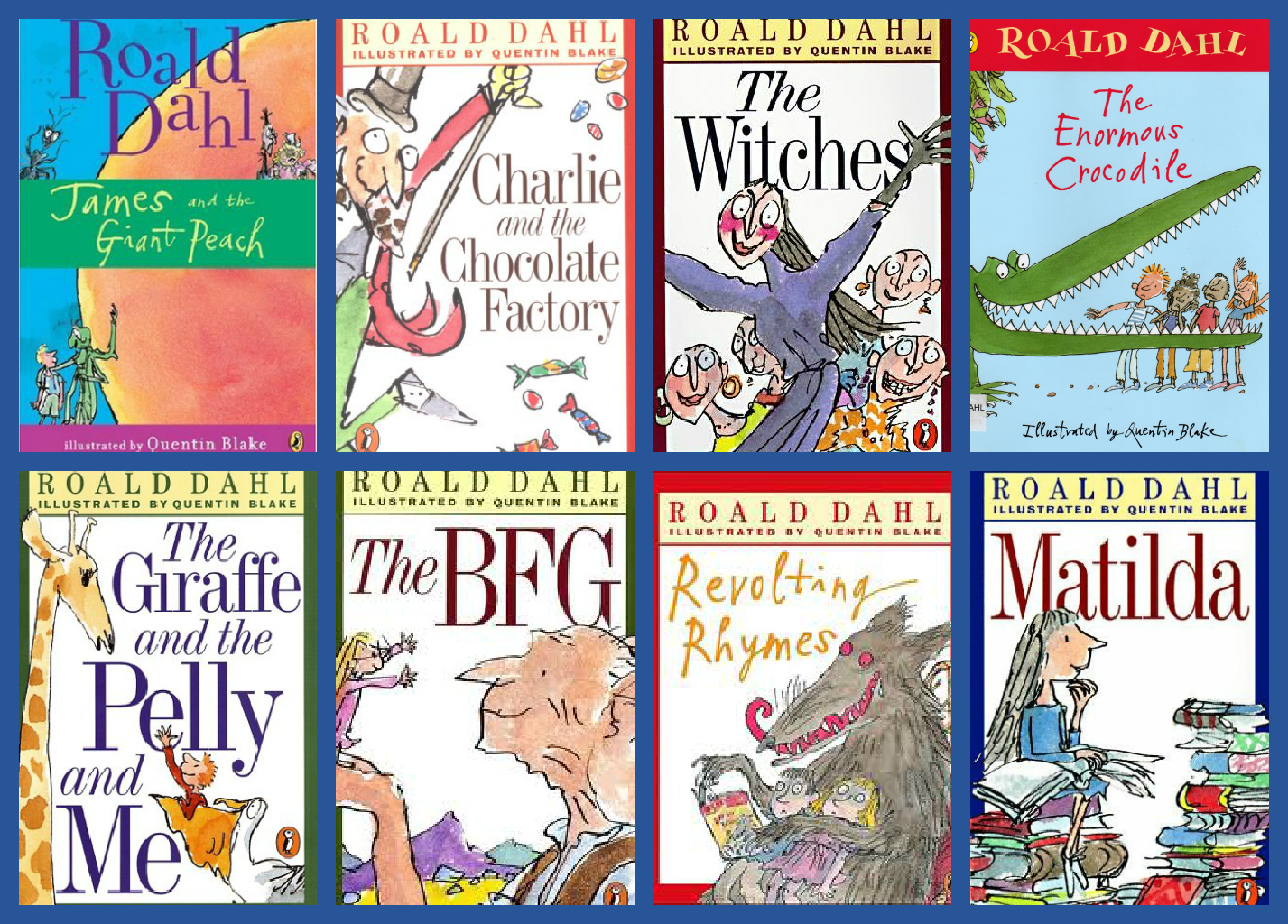
Az alábbiakban 10 érdekességet olvashatsz róla:
1. He was born in Wales but his parents were Norwegian.
2. Roald Dahl was named after the famous Norwegian explorer, Roald
Amundsen.
3. Roald Dahl was about 6’6″ tall (200 cm).
4. He always wrote in pencil on yellow paper.
5. It has been said that Roald Dahl created more than 250 new words.
6. He wrote articles for Playboy where his topics of choice included
wife-swapping, promiscuity, suicide, and adultery.
7. Dahl was hired to adapt Ian Fleming’s novels the James Bond novel You Only
Live Once but the script was completely rewritten.
8. In WWII he joined the Royal Air Force as a fighter pilot.
9. His books have been published in 34 different languages.
10. Roald Dahl passed away from a blood disease on November 23, 1990 at the
age of 74. Per his request, he was buried with all of his favourite things:
snooker cues, a bottle of Burgundy, chocolate, HB pencils, and a power
saw.
Vocabulary:
to be named after = elnevezve
explorer = felfedező
wife-swapping = feleségcsere
promiscuity = szabados szexuális élet
suicide = öngyilkosság
adultery = házasságtörés
to adapt = filmre adaptál (egy könyvet)
script = szövegkönyv
WWII (= World War II) = Második világháború
join = csatlakozik
fighter pilot = vadászpilóta
to pass away from = elhunyni vmiben
per his request = kérésére
snooker cues = snooker dákók
power saw = villanyfűrész
William Chester Minor (1834-1920)
Címkék: szótár William Chester Minor OED Oxford English Dictionary
2014.11.12. 14:46
Tudtad, hogy az Oxford English Dictonary nagy részét egy mentális zavarokkal küszködő, gyilkosságért elítélt, harctéri sebész írta egy elmegyógyintézetben?
William Chester Minor életéről az Index hírportálon is olvashatsz magyarul: http://index.hu/tudomany/til/2014/11/04/a_leghiresebb_angol_szotar_nagy_reszet_egy_orult_irta_az_elmegyogyintezetbol/
de az alábbi angol szövegből is megismerheted történetét:
William Chester Minor (1834-1920)
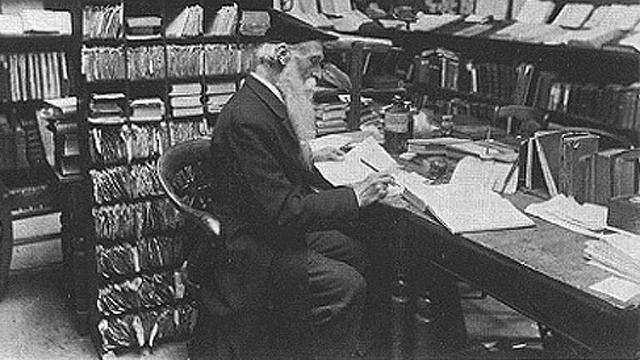
Minor was born in June 1834 in Ceylon, the son of American missionaries. His mother died when he was three, and his father subsequently remarried and had a second family. Minor was a clever sensitive lad who painted, played the flute, and spoke several languages but kept having "lascivious thoughts" about the local girls so he was sent back to America when he was 14 to live with an uncle. He went on to study medicine at Yale and became a surgeon in the Union Army in 1863.
In May 1864 he was at the Battle of the Wilderness and it is thought that the exposure to the full horrors of war including the burning alive of hundreds of soldiers, horrific casualties and mutilations triggered his mental illness. As part of his duties he was forced to brand the letter D on the face of an Irish deserter, and this incident caused him a great deal of mental torment.
At the end of the American Civil War Minor saw duty in NYC but he was strongly drawn to the red light area and spent increasing amounts of time and money on prostitutes. By 1867, his behaviour had become bizarre and the Army transferred him to a remote post. By 1868 Minor showed growing signs of mental instability, and placed in the US Government Hospital for the Insane. After 18 months he was allowed to resign and receive an Army pension.
He was discharged from the hospital in 1871 and went to London as part of a vacation. There he resumed going with prostitutes and at the same time his paranoia returned with a vengeance. He became obsessed with the idea that the Irish were going to punish him for the branding he carried out during the war. He started carrying a loaded gun for his own protection.
In an early morning in February 1872 after returning home late at night he woke up believing that someone was trying to get into his room. He chased after the intruder and shot at a man in the street. George Merritt, 34, was walking down Belvedere Road at 2am when Minor fired four shots two of which entered his neck. Merritt was declared dead on arrival at the hospital.
Minor was judged not guilty on grounds of insanity, and was detained as a "certified criminal lunatic". Minor was allocated two rooms in the asylum and was allowed to have books and painting materials.
Merritt's wife Eliza was left with seven children ranging from 12 months to 18 years to bring up with another on the way. Times were very hard for her and her children but wealthy Minor helped out financially and Eliza even asked to visit Minor. This highly unusual request was granted and she started visiting him monthly and even undertook to collect books from various London bookshops for him.
These visits did not last very long as Eliza took to drink but seemed to have greatly helped Minor as it gave him a new occupation. The Oxford English Dictionary (OED) editor Dr James Murray had an eight page flyer (a letter) inserted into several new books appealing for new readers to find words and quotations for the dictionary. One of these flyers found its way to Minor, perhaps in one of the books that Eliza brought him. He began reading and collecting books and turned one of his rooms into his library. This he put to good use, as he became a principal contributor of sixteenth and seventeenth century quotations to the first edition of the OED for over thirty years. Initially the OED editor, Dr James Murray, was unaware that Minor was insane but after many years he started regular visits to Minor in Broadmoor.
By 1902 Minor's mental health had deteriorated and he cut off his penis in an act of self-mutilation, which he thought would stop his lascivious thoughts. In 1910 following strong representations from Dr Murray, the then Home Secretary, Winston Churchill, signed the necessary papers to allow Minor to return to the mental hospital in the USA.
He died of complications arising from pneumonia on the 26th March 1920 in an old people’s home in New Haven, Connecticut, having been discharged from hospital shortly and is buried at Evergreen Cemetery New Haven. The last psychiatric diagnosis on Minor was that he suffering from dementia praecox or schizophrenia.
Vocabulary:
missionary = hittérítő
subsequently = aztán, azt követően
lascivious thoughts = buja gondolatok
mutilations = csonkítás
triggered = kivált, előidéz
brand = billogozni, bélyeget beleégetni
mental torment = lelki gyötrődés
insane = elmebeteg, örült, bolond
discharged from the hospital = kiengedték a kórházból
resumed = újrakezd, visszatér
vengeance = bosszú
obsessed with = vmi megszállottja
a loaded gun = megtöltött fegyver
to chase = üldözni
intruder = behatoló
declared dead = halottnak nyílvánítva
allocate = kiutal, rendelkezésére bocsát
asylum = elmegyógyintézet
This highly unusual request was granted = ezt a felettébb meglepő kérést engedélyezték
to undertake sth = elvállalni vmit
flyer = szórólap
insert = beilleszt, betesz
to appeal = kérni vmit
principal contributor= legfőbb közreműködő, külsős munkatárs
initially= kezdetben
quotations = idézetek
to deteriorate = romlani (pl. egészségi állapot)
self-mutilation = öncsonkítás
pneumonia = tüdőgyulladás
dementia praecox = korai elmezavar, feledékenység
Az alábbiakban olyan latin kifejezéseket olvashatsz, amelyeket az angol és a magyar nyelv is átvett.
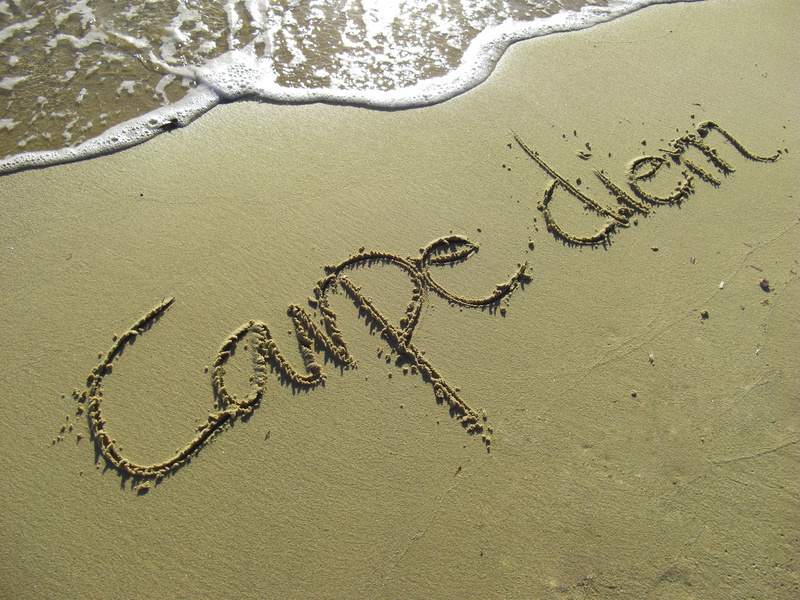
1. Persona Non Grata
= An unacceptable person
= Nem kívánatos személy
He was declared persona non grata and asked to leave the country within 48 hours.
2. Cogito Ergo Sum
= I think, therefore I am
= Gondolkodom, tehát vagyok
3. In vino veritas
= In wine, truth
= Borban az igazság
4. Carpe diem
= Enjoy the day, seize the day
=Ragadd meg a napot
5. Veni, vidi, vici
= I came, I saw, I conquered
= Jöttem, láttam, győztem
6. Et cetera
= and the rest
= satöbbi
We urgently need to buy medical equipment, drugs et cetera.
7. circa
= approximately, around
The house was built circa 1930.
8. versus, vs
= against
= vmivel szemben, ellen
What are the benefits of private versus state education?
9. via
= through
= keresztül
The London-Doha flight goes via Munich.
10. vice versa
= the other way round
= fordítva
He doesn't trust her, and vice versa (= she also doesn't trust him).
Tudtad, hogy az angolban a " fél" (= half) szót még három másik előtaggal is ki lehet fejezni, ezek a :
- semi-
- hemi- és a
- demi-
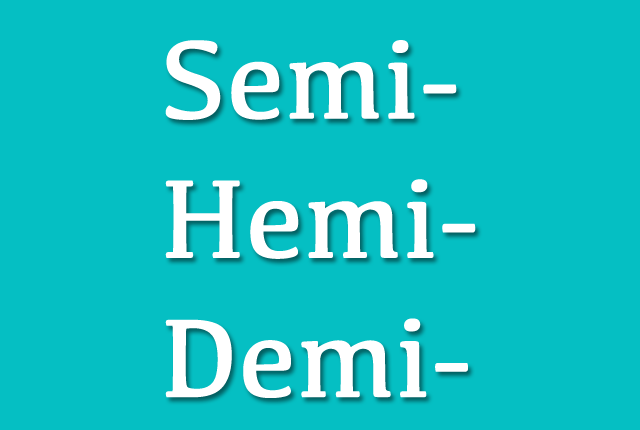
from: mentalfloss.com
Persze a half- használata a leggyakoribb, pl.
half-time = félidő
half-moon = félhold
half-price = félár
half-brother/sister = féltestvér
half-board = félpanzió
half-breed = félvér
half-hearted = kedvetlen, lagymatag
half-ripe = félérett
Utána a latin eredetű semi- következik (gyakoriságát tekintve), pl:
semicirle = félkör
semicolon = pontosvessző
semiconductor = félvezető
semifinal = középdöntő
semi-skilled = betanított (munkás)
semi-automatic = félautomata
semi-precious stone = féldrágakő
semi-skimmed (milk) = félzsíros (tej vagy tejtermék)
A görög eredetű hemi- előtaggal már csak egy ismert szó létezik:
hemisphere = félgömb
És a francia eredetű demi- előtaggal is egy szót találtam:
demigod = félisten
160 évvel ezelőtt, ezen a napon született Oscar Wilde, ír költő, író, drámaíró.
A rengeteg neki tulajdonított idézet közül választottam ki azt a tízet, amelyek a legjobban tetszenek:)

Oscar Wilde's statue in Dublin
from: http://skalathan.deviantart.com/
1. "I'm not young enough to know everything."
Nem vagyok elég fiatal ahhoz, hogy mindent tudjak.
2. "The old believe everything, the middle-aged suspect everything, and the young know everything."
Az idős ember mindent elhisz, a középkorú mindent sejt, a fiatal mindent tud.
3. "Women are made to be loved, not understood"
A nő rendeltetése az, hogy szeressék, nem az hogy megértsék.
4. "The only thing worse than being talked about is not being talked about."
Csak egyetlendolog rosszabb annál, ha beszélnek rólad: ha nem beszélnek.
5. "We live in an age when unnecessary things are our only necessities."
Olyan korban élünk, amikor csak a felesleges dolgok a szükségleteink.
6. "Crying is the refuge of plain women. Pretty women go shopping."
A sírás az egyszerű nőknek való. A csinos nők elmennek vásárolni.
7. "I can resist anything but temptation."
Mindennek ellen tudok állni, kivéve a kísértésnek.
8. "Thirty-five is a very attractive age. London society is full of women of the very highest birth who have, of their own free choice, remained thirty-five for years."
A 35 év nagyon vonzó kor. A londoni társaság tele van igen előkelő származású hölgyekkel, akik szabad elhatározásukból éveken keresztül megmaradtak 35 esztendősnek.
9. “When I was young, I thought that money was the most important thing in life; now that I am old, I know it is”
Amikor fiatal voltam, azt hittem, a pénz a legfontosabb dolog az életben; most, hogy öreg vagyok, már tudom, hogy az.
10. "I can believe anything, provided that it is quite incredible."
Mindent el tudok hinni, feltéve ha az eléggé hihetetlen.
Az alábbiakban 10 olyan állatos kifejezést találsz, melyet emberek jellemzésére használhatsz:

a képen egy jelenlegi kedvenc: lajhár (= sloth)
1. a bookworm = könyvmoly
2. an early bird = koránkelő
3. a night owl = éjjeli bagoly
4. an eager beaver = törtető, stréber (szó szerint: buzgó hód)
5. a fat cat = nagy kutya, nagy hal, pénzes pasas
6. a top dog = fejes, főnök, góré
7. a mouse potato = internetfüggő
8. a black sheep = feketebárány (a családban)
9. a lone wolf = magányos farkas
10. a guinea pig = kisérleti nyúl (szó szerint: tengerimalac)
Itt pedig 10 "állatos" hasonlatot olvashatsz:
10 similies:
1. as blind as a bat = vak, mint a denevér
2. as innocent as a lamb = ártatlan, mint a bárány
3. as poor as a church mouse = szegény, mint a templom egere
4. as quiet as a mouse = csendes, mint az egér
5. as sly as a fox = ravasz, mint a róka
6. as stubborn as a mule = makacs, mint az öszvér
7. as brave as a lion = bátor, mint az oroszlán
8. as free as a bird = szabad, mint a madár
9. as proud as a peacock = büszke, mint a páva
10. as wise as an owl = bölcs, mint a bagoly
A BBC egy 60 másodperces rövid filmben foglalta össze az Ebola-járvány jellemzőit:
http://www.bbc.com/news/health-28105531

photo from www.bbc.co.uk
- Ebola symptoms / Az Ebola tünetei
diarrhoe / hasmenés
vomiting / hányás
weakness / gyengeség
fever / láz
bleeding / vérzés
- spread by contact with bodily fluids / testnedvekkel történő érintkezés útján terjed
- attacks internal organs / belső szerveket támad meg
- and is highly infectious / és erősen fertőző
- outbreak detected in Guinea in March / a járvány Guineából tört ki márciusban
- infected people must be treated in isolation / a fertőző embereket elkülönítve kell kezelni
- patients are given fluids to prevent dehydration / a betegek folyadékot kapnak a kiszáradás megelőzésére
- but there is no known cure / de nincs ismert gyógymód
- current outbreak is killing 70% of those infected / a jelenlegi járvány a fertőzöttek 70%-ra végzete
Az alábbi feladatsorban házassággal és válással kapcsolatos kifejezéseket gyakorolhatsz, illetve tanulhatsz meg.


from The Guardian
Egészítsd ki a mondatokat a megadott szavak, kifejezések egyikével:
A. honeymoon = mézeshetek, nászút
B. got engaged = eljegyezték egymást
C. marriage of convinience = érdekházasság
D. divoreced = elváltak
E. proposed = megkért(e a kezemet)
F. tie the knot = megházasodni
G. split-up = szakítás
H. wedding reception = lakodalom
I. on the rocks = zátonyra futott (házasság)
J. settle down = megállapodni, családot alapítani
1. So when are you two going to ...............................?
2. A .............................. is a kind of a marriage in which the partners have married, not because they love each other, but in order to get an advantage, such as the right to live in the other partner's country.
3. My parents separated when I was six and ..............................a couple of years later.
4. I think their marriage is .......................................
5. The wedding will be held at St Martin's Church and the ............................................ at Crathorne Hotel.
6. Eventually I'd like to .........................................and have a family , but not yet.
7. Debbie and Christa have just ......................................
8. A .................................... is an occasion when two people end their relationship.
9. I remember the night your father ............................to me.
10. Where are you going on your ...............................?
Answer: 1-F; 2-C; 3-D; 4-I; 5-H; 6-J; 7-B; 8-G; 9-E; 10-A
from: http://dictionary.cambridge.org/
2009 óta több országban hivatalosan is megtartják a Kávé Világnapját.
Ebből az apropóból szerepel az alábbiakban 15 "kávés" kifejezés:

1. coffee bean = kávészem
2. coffee cup / saucer = kávéscsésze / csészealj
3. coffee mug = kávésbögre
4. coffee break = kávészünet
5. coffee table = dohányzóasztal
6. coffee grinder = kávédaráló
7. coffee percolator = kávéfőző
8. coffee grounds = kávézacc
9. coffee set = kávéskészlet
10. black coffee = fekete kávé
11. white coffee = tejeskávé
12. ersatz coffee = pótkávé
13. decaffeinated coffee = koffeinmentes kávé
14. I could do with a cup of coffee = jól esne egy csésze kávé
15. Wake up and smell the coffee = ébresztő / térj már magadhoz
10 Interesting Facts about Fruits
Címkék: apple orange mango pear durian avocado fruit strawberry tomato banana peach plum watermelon raspberry Fruit Salad Tree
2014.09.16. 10:33
1. Apples, pears, peaches, and plums, among others, are all members of the rose family.
Az alma, a körte, az őszibarack és a szilva – több más gyümölccsel együtt – a rózsafélék családjába tartozik.
2. In strictly botanical terms, strawberries and raspberries are not actual berries, but bananas and avocados technically are.
Szigorú növénytani értelemben véve az eper és a málna nem bogyós gyümölcsök, de a banán és az avokádó igen.
3. The durian, a fruit widely available in Asia, is awfully stinky—it smells of rotting meat. The stench is so bad that the fruit has been banned on Singapore’s public train systems.
Az Ázsiában sok helyen kapható durian gyümölcs iszonyú büdös - rothadó hús szagát árasztja. Ez annyira büdös, hogy a szingapúri állami vasúttársaság szerelvényein be is tiltották a gyümölcs fogyasztását.
4. Despite the popularity of perennial favourites like apples and oranges, the most widely consumed fruit in the world is the mango.
Az alma és a narancs népszerűsége ellenére, a legszélesebb körben fogyasztott gyümölcs a világon a mangó.
5. Bananas are slightly radioactive because they contain potassium.
A banán enyhén radioaktív, mivel káliumot tartalmaz.
6. Square watermelons are grown by Japanese farmers for easier stack and store.
A japán gazdák kocka alakú dinnyét termesztenek a könnyebb tárolás érdekében.
7. There is a tree called Fruit Salad Tree that sprouts 3 to 7 different fruits int he same tree.
Létezik egy Gyümölcssaláta Fa nevű növény, amelyen 3-7 különböző gyümölcs terem.
8. Humans share 50% of their DNA with bananas.
Az emberi DNS 50%-ban megegyezik a banánéval.
9. Strawberries have more vitamin C than oranges.
Az eper C-vitamin tartalma magasabb, mint a narancsé.
10. Botanically, a tomato is a fruit.
Növénytani értelemben a paradicsom egy gyümölcs.
from: www.factslides.com
MUST – MUST NOT –
HAVE TO - HAD TO – DON’T HAVE TO – DO YOU HAVE TO?

photo: http://www.eflsensei.com
Egészítsd ki a mondatokat a „kell” szó megfelelő alakjával. Megjelöltem azokat a mondatokat, ahol tagadó formát kell használni.
-
I ............. call my mum tonight!
-
You can come if you like, but you ................................. (not)
-
I ............... remember to pay John for the tickets.
-
You look so tired, David. You ................ get some rest.
-
I ..................... catch the train so I left early.
-
You .................... tell Anne – she would be so upset. (not)
-
There will be food at the party so we ........................... bring any. (not)
-
I .......................... learn new words. We're having a test tomorrow
-
I ......................... learn new words. I want to understand better English newspapers.
-
Sarah .......................... work tomorrow. She'll have a day off. (not)
-
You ................... park here. Parking is prohibited. (not)
-
It’s a brilliant movie – you ..................... see it!
-
Tomorrow is Sunday so I .......................... wake up early. (not)
-
You ................... try this chicken – it’s delicious.
-
You have worked all day. You .................. be exhausted.
Answer: 1. must; 2. don't have to; 3. must; 4. must; 5. had to; 6. mustn't; 7. don't have to; 8. have to; 9. must; 10. doesn't have to; 11. mustn't; 12. must; 13. don't have to; 14. must; 15. must
Az alábbi listában 11 jól ismert "névvel" találkozhatsz:
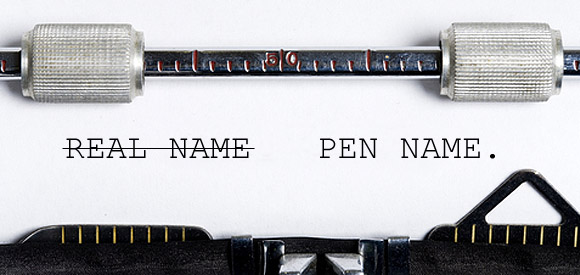
photo from: http://danielidescomm.com/blog/
1. first name / given name / Christian name = keresztnév
My sister first name is Ildikó.
2. surname / family name = családi név
Her surname is Kovács.
3. full name = teljes név
Her full name is Ildikó Kovács.
4. maiden / birth name = lánykori / születési név
Demi Moore's maiden names is Guynes, but she kept "Moore" after divorcing her first husband.
5. middle name = középső név (második keresztnév)
Daniel Craig’s middle name is Wroughton, so his full name is Daniel Wroughton Craig.
6. middle initial = középső, rövidített név
The „C” in Arthur C. Clarke’s name stands for Charles.
7. penname = írói álnév
Marie-Henri Beyle better known by his pen name Stendhal.
8. pseudonym = álnév
Why do some writers use pseudonyms?
9. reign / regnal name = uralkodói név
A regnal name, or reign name, is a name used by some monarchs and popes during their reigns. For example Karol Józef Wojtyła was known as Pope Saint John Paul II.
10. nickname = becenév
Ernesto "Che" Guevara, commonly known by his nickname as „el Che” or simply „Che”.
11. user name = felhasználói név
A name or other word that you sometimes need to use together with a password before you can use a computer or the internet
Az alábbi videóból megtudhatod mit árul el rólad a kézírásod, de egyben rengeteg, személyiségre vonatkozó melléknevet, kifejezést is megtanulhatsz:
What Your Handwriting Says About You
https://www.youtube.com/watch?v=eurGvShP0T8
Adjectives and expressions related to personality:
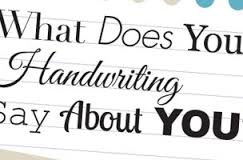
shy = félénk
studious = szorgalmas
concentrated = koncentráló, összpontosító
meticulus = aprólékos(kodó)
outgoing = társaságkedvelő
love attention =imádja a figyelmet, szeret a középpontban lenni
people-oriented = emberközpontú
well-adjusted = könnyen alkalmazkodó
adaptable = alkalmazkodó, rugalmas
enjoy freedom = szabadságszerető
don't like crowds = nem szereti a tömeget
don't like to be overwhelmed = kb. nem szereti ha rátelepszenek
can't stand to be alone = nem szeret egyedül lenni
tend to crowd people = kb. szereti a tömeget
artistic = művészi hajlamokkal bíró
creative = kreatív, ötletes
agressive = agresszív
intense = mély érzelmeket átélő
intelligent = intelligens
curious = kiváncsi, érdeklődő
logical = logikus, ésszerű
systematic = rendszeres, módszeres
good self-esteem = jó önbecsülés, megfelelő önértékelés
optimistic = optimista, derűlátó
ambitious = ambiciózus, törekvő
confident = magabiztos
comfortable in your skin = jól érzi magát a bőrében
talkative = beszédes
social = társaságkedvelő
expressive = kifejező, jó kifejezőképességgel bíró
private = zárkozott
introvert = befelé forduló
imaginative = jó képzelőerővel rendelkező
procrastinator = halogató
detail-oriented = részletekre koncentráló
organized = összeszedett, rendszerezett
emphatic = határozott
visionary = képzelgő, álmodozó
child-like = gyerekes
overly self-critical = túlzóan önkritikus
Base and Strong Adjectives
Címkék: melléknevek adjectives strong adjectives base adjectives
2014.08.31. 07:21
Base adjectives = "alap" melléknevek, pl. happy, sad, hungry, small, big etc.
A very és a really határozószavakkal használható, pl. very happy, really hungry etc.
Strong /limit/ extreme adjectives = "erős", "túlzó" melléknevek pl.thrilled, depressed, starving, tiny, huge etc.
Az absolutely és a really határozószavakkal használható, pl. absolutely thrilled, really huge etc.
Az erős melléknevekkel kifejezhető valaminek a mértéke, intenzítása.
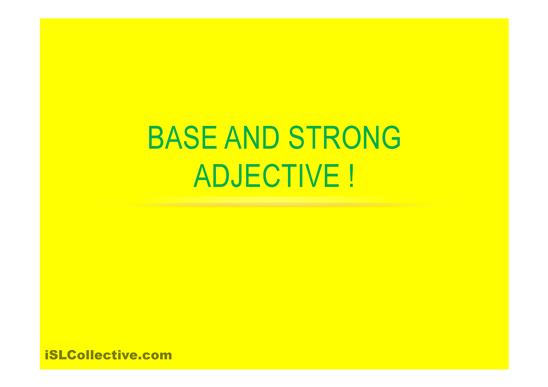
Examples
Base / Strong adjectives
1. small - tiny
2. tasty - delicious
3. angry - furious
4. scared - terrified
5. happy - delighted
6. tired - exhausted
7. hot - boiling
8. cold - freezing
9. hungry - startving, famished
10. big - enormous, huge
11. dirty - filthy
12. good - great
13. bad - awful
14. good - fantastic, smashing
15. sad - devastated, miserable, depressed
16. funny - hilarious
17. beautiful - stunning
18. wet - get soaked
19. bright - dazzling
20. clean - spotless
21. neat - immaculate
22. old - ancient
23. ugly - hideous
24. worried - anxious
25. valuable - priceless
26. clever - genious
27. excited - thrilled
28. interesting - fascinating
29. poor - impoverished
30. surprised - amazed, astonished, shocked
Az alábbiakban további 10, számokkal kapcsolatos kifejezést olvashatsz:

1. at the eleventh hour = az utolsó pillanatban, a 24. órában
We only received the signatures at the eleventh hour.
Csak az utolsó pillanatban kaptuk meg az aláírásokat.
2. a dime a dozen = gyakori, nagyon hétköznapi, tizenkettő egy tucat
People with your skills are a dime a dozen these days.
Manapság sokan vannak, akik ugyanolyan szakképzettséggel rendelkeznek, mint Te.
3. talk nineteen (or ten) to the dozen = egyfolytában beszél; be nem áll a szája
Sue was chatting away nineteen to the dozen behind me and I couldn't concentrate. Sue-nak be nem állt a szája mögöttem és nem tudtam koncentrálni.
4. 15-minutes of fame = 15 perc hírnév
"In the future everybody will be world famous for fifteen minutes." (Andy Warhol)
"A jövőben mindenki híres lesz 15 percre."
5. catch-22 = a 22-es csapdája
It's a Catch-22 situation - without experience you can't get a job and without a job you can't get experience.
Ez a 22-es csapdája - gyakorlat nélkül nem tudsz állást szerezni, állás nélkül viszont nem szerzel gyakorlatot..
6. 24/7 = napi 24 órában, hetente hétszer, mindig, állandóan
We offer 24/7 internet access.
Állandó internet hozzáférést biztosítunk.
7. forty winks = rövid szunyokálás, bóbiskolás
He usually has forty winks going home on the train.
Általában szunyókálni szokott hazafelé a vonaton.
8. nine out of ten = tízből kilencszer, többnyire, szinte mindig
Nine times out of ten, you can fix it.
Szinte mindig meg tudod javítani.
9. one in a million = egy a millióhoz (esély); nagyon valószínűtlen
Don't worry - the chances of anything going wrong are one in a million.
Ne aggódj, annak az esélye, hogy valami baj történik egy a millióhoz.
10. zero in on = koncentrálni, fókuszálni vmire
We don't have a lot of time to discuss the issue, so we'll have to zero in on.
Nincs sok időnk megvitatni a témát, így arra kell koncentrálnunk.
Az alábbiakban 10, számokkal kapcsolatos kifejezést találsz:

1. back to square one = vissza az elejére, a kiindulópontra; elölről kezdeni vmit
None of the applicants were suitable, so we had to go back to square one and advertise the job again.
Egyik pályázó sem volt megfelelő, ezért elölről kellett mindent kezdeni és meghirdettük ismét az állást.
2. to be in two minds about sth = nehezen dönteni, hezitálni vmiről
I'm in two minds about accepting his offer.
Hezitálok, hogy elfogadjam-e az ajánlatát.
3. like two peas in a pod = úgy hasonlítanak, mint két tojás
pea = borsó
pod = borsóhüvely
You can tell they're brothers - they're like two peas in a pod.
Látszik, hogy testvérek - úgy hasonlítanak egymásra, mint két tojás.
4. kill two birds with one stone = két legyet üt egy csapásra
I killed two birds with one stone and saw some old friends while I was visiting my parents.
Két legyet ütöttem egy csapásra, találkoztam néhány régi barátommal, míg a szüleimet meglátogattam.
5. put two and two together = levonja a következtetést, kikövetkeztet, összeáll a kép, veszi az adást
She didn't tell me she was pregnant - I just put two and two together.
Nem mondta el, hogy terhes - de kikövetkeztettem.
6. it takes two to tango = kettőn áll a vásár
She blames Tracy for stealing her husband.' 'Well, it takes two to tango.
Tracy-t vádolja a férje elhódításával - de kettőn áll a vásár.
7. nine-to-five job = kilenctőlötig tartó munka
She's tired of working nine-to-five.
Belefáradt a 9-től 5-ig tartó munkába.
8. to be in seventh heaven = a fellegekben járni
Since they got married, they've been in seventh heaven.
Amióta összeházasodtak a fellegekben járnak.
9. to be on cloud nine = a fellegekben jár, repdes a boldogságtól
"Was Helen pleased about getting that job?" "Pleased? She was on cloud nine!"
Örült Helen, hogy megkapta azt az állást? Örült-e? Repdesett a boldogságtól.
10. a stitch in time saves nine = amit ma megtehetsz, ne halaszd holnapra
stitch = öltés
Let's patch the roof before that hole gets bigger. A stitch in time saves nine.
Javítsuk meg a tetőt, mielőtt a lyuk nagyobb lesz. Amit ma megtehetsz, ne halaszd holnapra.
Amerikai tudósok szerint az ember által érzékelhető több ezer illat 10 fő csoportba osztható.
The thousands of aromas humans can smell can be sorted into 10 basic categories, US scientists say.

photo: mentalfloss.com
-
fragrant = kellemes illatú, illatos
-
woody/resinous = erdő/gyanta illatú
-
fruity (non-citrus) = gyümölcsillatú (nem citrusféle)
-
chemical = vegyszer
-
minty/peppermint = mentás / borsmentás
-
sweet = édes
-
popcorn = pattogatott kukorica
-
lemon = citrom
-
pungent = csípős
-
decayed = rothadt, romlott
Smell-related idioms:
1. smell a rat = valami bűzlik
2. smell fishy = valami gyanús
3. wake up and smell the coffee = észrevenni a valóságot, felébredni és szembenézni a tényekkel
4. come out smelling like a rose = jól / sikeresen kikerülni egy helyzetből
5. smell blood = vért szimatol
source: www.bbc.com/news/health
Egy jó kis dal az angol nyelvtanról, illetve a gyakori hibákról :)
A címe "Word Crimes" ami kb. rossz nyelvhasználatot jelent, pl. it's használata its helyett stb.
"Weird Al" Yankovic - Word Crimes
https://www.youtube.com/
"Weird Al" Yankovic - Word Crimes https://www.youtube.com/watch?v=8Gv0H-vPoDc
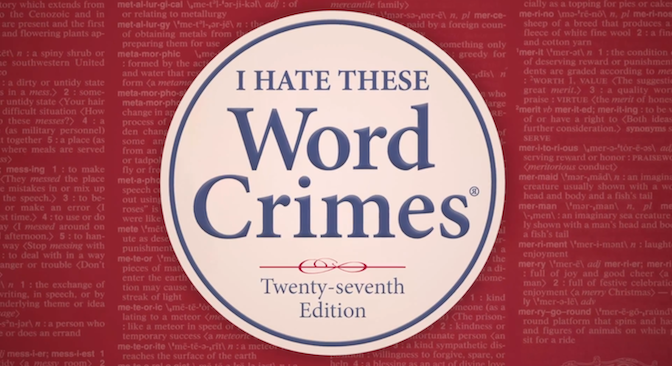
Vocabulary:
conjugate = igeragozás
flunk = megbukik
mock = kigúnyol
nomenclature = szakkifejezés
stammer = dadog
moron = idióta
mangling = szétszed, szétroncsol
proofreader = korrektor, lektor
cunning = ravasz
homophones = két különböző jelentésű és írású szó, melyek kiejtése megegyezik (pl. know - no)
coincidence = véletlen
smack = megüt
crowbar = feszítővas
apparent = nyilvánvaló
errant = rossz
incoherent = zavaros, összefüggéstelen
prose = próza
dopey = idióta, hülye
lost cause = reménytelen eset
gene pool = génállomány
Hungarian Grand Prix
Címkék: Forma-1 Formula-1 Magyar Nagydíj Hungarian Grand Prix Mogyoróf
2014.07.29. 10:25
A vasárnapi Magyar Nagydíjhoz kapcsolódóan néhány tény az itthoni Forma-1-ről:
Did you know?
-
The first Hungarian Grand Prix was held in 1936 in Népliget.
-
CEO Bernie Ecclestone originally wanted a race in Moscow but when that fell through he turned to Hungary.
-
The 1986 Hungarian Grand Prix was the first Formula One race to take place behind the Iron Curtain.
-
The circuit was quickly built, it took only 8 months.
-
Race information:
Laps : 70
Circuit length: 4.381 km
Turns: 14
Race length: 306.663 km
-
Most fans come from Finland.
-
Zsolt Baumgartner is the only Hungarian to ever start an F1 race.
-
Curiously, another Hungarian, Ferenc Szisz, won the first grand prix, which was held in 1906 near Le Mans, France.
-
Two drivers have collected 4 wins at the Hungaroring: Schumacher and Hamilton.
-
Ayrton Senna won 3 times in Hungary, in 1988, 1991 and 1992, while five other drivers have two wins each.
-
In terms of constructors, McLaren have won more than one-third of all the races at the Hungaroring, with 11 victories. Williams is second with 7 and Ferrari have taken 5 wins.
-
Run in the heat of a central European summer, it is the only current Grand Prix venue that had never seen a wet race up until the 2006 Hungarian Grand Prix.
-
Fernando Alonso (in 2003), the first Grand Prix winner from Spain, who also became the youngest ever driver (at the time) to win a GP.
-
At the 2013 Hungarian Grand Prix, it was confirmed that Hungary will continue to host a Formula 1 race until 2022.
-
At the beginning of the race the Grand Prix trophies were provided by the Hollóháza Porcelain Manufactory. then the trophies have been manufactured in the traditional Herend Porcelain Manufactory since 2006.
Vocabulary
to hold (held, held) = tartani
CEO (chief-executive-officer) = vezérigazgató
fall through = meghiúsul
to take place = megrendezésre kerül
Iron Curtain = Vasfüggöny
circuit = útvonal, pálya
laps = körök
circuit length = a pálya hossza
turns = kanyarok
race length = a verseny hossza
fan = szurkoló
curiously = érdekes módon
constructor (itt) = csapat
current = jelenlegi
venue = helyszín
provided = biztosítva vmi vki által
from: http://bleacherreport.com; wikipedia.org


